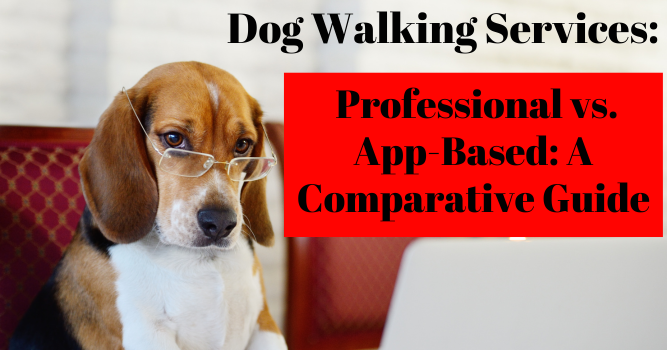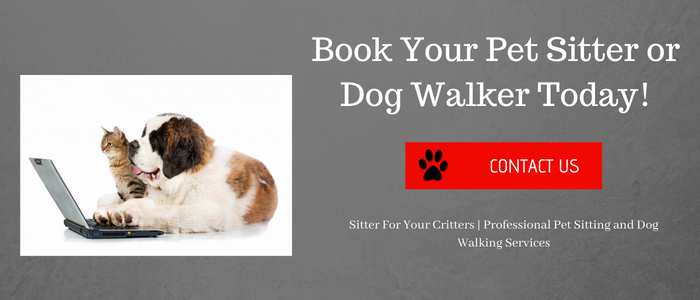As a responsible pet owner, ensuring your dog gets the proper care, exercise, and attention they need is a priority. For many, hiring a dog walker is a solution to managing busy schedules while providing their dogs with the daily exercise and enrichment they require. However, not all dog-walking services are created equal. Whether considering a professional dog-walking company or using an app-based platform, understanding the differences can help you make the best decision for your pet’s safety and well-being.
In this guide, we’ll break down the key factors to consider when vetting a dog walker, comparing professional dog-walking companies to app-based platforms. From safety protocols to customized care and reliability, you’ll gain insight into what makes one service better for your dog’s unique needs.

Professional Dog Walking Companies vs. App-Based Platforms
There are two main avenues for hiring a dog walker: professional dog-walking companies and app-based platforms like Rover and Wag. Both options have pros and cons, and the decision often depends on your priorities for your dog’s care. Let’s explore each option in detail.
Professional Dog Walking Companies
-
- Training and Experience: Professional dog-walking companies typically hire experienced walkers who undergo rigorous training in dog handling, behavior, and first aid. This ensures that your walker has the necessary skills to care for your dog in a variety of situations, from managing leash behavior to responding to emergencies. These walkers are also more likely to have experience with a range of dog breeds and temperaments, which can be reassuring if your dog has specific needs or behaviors.
- Insurance and Bonding: One of the major benefits of hiring through a professional company is the added layer of security. Most professional companies are insured and bonded, which means they are financially responsible for any accidents or incidents that occur while your dog is in their care. This provides peace of mind, knowing that the company is accountable for your pet’s safety.
- Personalized Care: Professional dog walkers often take the time to understand your dog’s specific needs, preferences, and routines. They can tailor walks and activities based on your dog’s energy levels, temperament, and behavioral traits. If your dog requires special care or has medical needs, these walkers are better equipped to manage such situations.
- Safety Protocols: Safety is a top priority for professional dog-walking companies. They have strict protocols in place, such as using secure harnesses and leashes, assessing the environment for potential hazards, and avoiding risky situations like off-leash play in unsafe areas. Walkers are trained to handle unexpected situations, like encountering aggressive dogs or traffic hazards.
- Consistency and Reliability: Professional companies typically offer a high level of reliability and consistency. You can expect the same walker to show up at the scheduled time, ensuring that your dog builds a trusting relationship with their walker. This consistency is especially important for dogs who thrive on routine and can become anxious with changes.
- Transparent Communication: Professional dog walkers often provide regular updates on your dog’s walk, including pictures, notes, and any concerns they might have. Open communication is a hallmark of these services, and they’re usually quick to address any issues or accommodate changes in your schedule.
App-Based Platforms
- Convenience and Accessibility: App-based platforms like Rover and Wag have revolutionized the way pet owners hire dog walkers. With a few taps on your smartphone, you can book a walker, sometimes even on short notice. These platforms offer convenience and flexibility, making them a popular option for pet owners with unpredictable schedules.
- Variable Training and Experience: Unlike professional companies, app-based platforms have varying standards for their walkers. Some may have extensive experience and training, while others may be relatively new to dog walking. There is no universal guarantee of quality across the board, so the level of expertise can be hit or miss. You may need to vet individual walkers yourself by reading reviews and asking about their background and training.
- Insurance and Bonding: One of the significant drawbacks of app-based platforms is the lack of comprehensive insurance or bonding. While some platforms offer basic coverage in case of accidents, it’s not always as robust or reliable as what you would get from a professional dog-walking company. This leaves you with less assurance in the event of a mishap.
- Personalized Care: While some app-based walkers may provide excellent care, the level of personalized attention can vary widely. Since walkers on these platforms are often juggling multiple clients, they may not have the time or incentive to get to know your dog’s specific needs in detail. As a result, the care might not be as tailored as you’d like, especially for dogs with particular requirements.
- Inconsistent Safety Measures: Safety protocols can vary greatly from one walker to another on app-based platforms. While some walkers may be diligent about using secure leashes, others might be less cautious. Additionally, the environmental assessments and adherence to safety guidelines are less standardized, potentially increasing the risk to your pet.
- Reliability and Consistency: One of the potential downsides of using app-based platforms is the lack of consistency. Walkers may change frequently, leading to disruptions in your dog’s routine. This can be particularly problematic for dogs that need structure or are slow to warm up to new people.
- Communication and Accountability: While some walkers on app-based platforms are communicative and responsive, others may not provide regular updates or address concerns promptly. The level of accountability can also vary, as individual walkers aren’t always subject to the same oversight as professional companies.
Key Factors to Consider When Vetting a Dog Walker
When choosing between a professional dog walker and an app-based walker, consider the following:
- Your Dog’s Needs: If your dog has medical needs, behavioral quirks, or requires a specific type of care, a professional dog-walking company may be the better choice. These walkers often have the expertise to manage unique situations.
- Safety: Prioritize safety by ensuring that the walker follows strict protocols, uses secure equipment, and is trained in handling emergencies. Professional companies generally offer more consistent safety measures than app-based platforms.
- Reliability: If maintaining a consistent routine is important for your dog, professional dog-walking companies are more likely to provide a dedicated walker, whereas app-based platforms may have more frequent turnover.
- Insurance and Accountability: For peace of mind, hiring a walker through a company that offers insurance and bonding is a safer option than relying on app-based platforms, which may not provide the same level of financial protection.
Conclusion
While app-based platforms offer convenience and flexibility, professional dog-walking companies often provide superior care, expertise, and reliability. When it comes to vetting your dog walker, it’s crucial to consider your dog’s specific needs and preferences. A professional dog walker can ensure your pet’s safety, well-being, and a happy, fulfilling experience during their walks. Whether you choose a company or an app, investing time in selecting the right walker will give you peace of mind and a healthier, happier dog.

